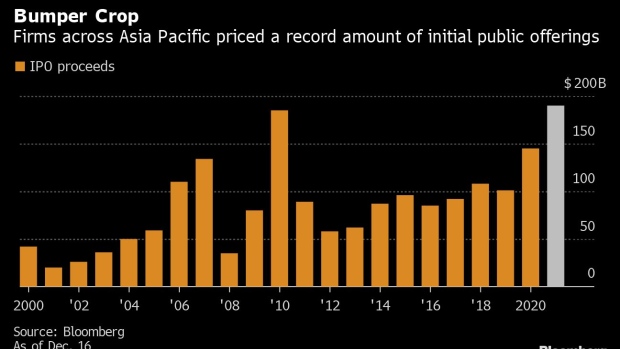Dec 18, 2021
IPOs in Asia Face Headwinds After Record Year of Fundraising
, Bloomberg News

(Bloomberg) -- After a bumper year of stock listings, Asian companies may find it hard to repeat the success in 2022 given the prospect of rising interest rates and China’s tightening grip on Big Tech.
Thanks to a blistering first half amid a global boom, initial public offerings in the region have reached $190 billion so far this year, already a record and up 31% from the whole of 2020. But the momentum has weakened notably in recent months as Beijing escalated a regulatory assault on private enterprise, putting major deals on hold and injecting uncertainties into next year.
Bankers say they expect Asia’s IPO market to be less frenzied and more balanced in 2022, as higher inflation erodes valuations of tech firms and tighter U.S. monetary policy reduces the supply of idle cash. The listings landscape may also look more diverse, with South Korea and India charging ahead and industries from clean energy to financial services filling the void left by once-dominant Chinese tech.
“Markets in 2022 are going to face a more normalized environment,” said William Smiley, co-head of equity capital markets at Goldman Sachs Group Inc. in Asia ex-Japan. “Withdrawal of fiscal and monetary stimulus, coupled with expectations for higher inflation may challenge risk assets, including equity markets.”
Beijing’s tight scrutiny of its tech firms, on issues ranging from data security to a loophole long used by companies to list overseas, also is expected to continue to slow the pace of fundraising from the sector.
This, plus the secondary market’s sluggish performance, have pushed Hong Kong, a popular destination for Chinese tech firms, out of the world’s top three listing venues. Several companies, from snack producer Weilong Delicious Global Holdings Ltd. to Apple Inc.’s supplier Biel Crystal Manufactory Ltd., have pushed back share offerings in the city, a development set to make the last three months of this year the weakest fourth quarter since 2018 for Asian IPOs.
‘Diverting From China’
Picking up the slack could be Chinese firms not affected by Beijing’s regulatory clampdown or beneficiaries of the nation’s development priorities, including new energy providers and electric vehicle makers.
The new year should see a more varied group of companies coming to the market, said Magnus Andersson, co-head of equity capital markets for Asia Pacific at Morgan Stanley. “It’s not only consumer, internet and tech, it’s also more industrials and financial institutions.”
Candidates include startup Hozon New Energy Automobile Co. and the property management business of developer Longfor Group Holdings Ltd., Bloomberg has reported earlier.
The subdued presence of Chinese tech will also help make the region’s IPO pipeline geographically more balanced, as South Korea, India and Southeast Asia maintain a busy issuance calendar.
Companies in India, South Korea and Indonesia have all raised record amounts via first-time share sales this year. And there’s more to come: Mega deals in the works include LG Energy Solution’s $10.8 billion IPO in Seoul and Life Insurance Corp. of India’s Mumbai offering with a valuation as high as $131 billion.
Some of Southeast Asia’s biggest tech unicorns also are expected to float shares next year, said Selina Cheung, co-head of equity capital markets, Asia at UBS Group AG. “Now it’s the right time as investors’ attention is diverting from China, at least over the short-term.”
Homecoming IPOs
Despite expectations for weaker supply from Chinese tech firms as first-time share sellers, an increased number of their U.S.-traded peers will likely seek listings in Hong Kong or Shanghai, a phenomenon known as ‘homecoming’.
A few prominent names that have listed in the Asian financial hub in recent years include Weibo Corp., Baidu Inc. and Alibaba Group Holding Ltd. The trend is expected to accelerate amid growing threats from the U.S. to delist Chinese firms there.
Already in the queue for such listings in Hong Kong are ride-hailing giant Didi Global Inc. and streaming video site IQiyi Inc., while Futu Holdings Ltd., Tencent Music Entertainment Group and Pinduoduo Inc. are also likely candidates.
Once Beijing’s regulatory picture clears up, “issuance will rebound,” said Goldman’s Smiley. “Positioning is light and China is under-owned.”
©2021 Bloomberg L.P.


